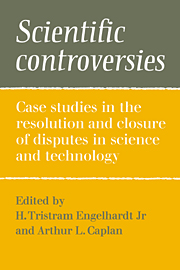 Scientific Controversies
Scientific Controversies Book contents
Introduction: Patterns of controversy and closure: the interplay of knowledge, values, and political forces
Published online by Cambridge University Press: 03 February 2010
Summary
For some time the analysis of science by philosophers, sociologists, historians, and others has been dominated by discussions about theory change and development. Metascientific studies have not progressed far beyond bitter wrangles as to the adequacy of such concepts as “paradigms,” “research traditions,” “themata,” and “theories” for adequately describing developments over time in various fields of scientific inquiry. In many respects these disputes have shed a great deal of light on the manner in which scientific ideas change and evolve, but they have also obscured important questions that need to be asked about conceptual development in science in order to understand this process fully and to facilitate the formulation of public policy with respect to science and technology.
This volume takes as its focus the notion of controversy. Controversies characterize intellectual change and developments within and about science. Disputes among scientists and between scientists and laymen are easy to locate in the history of science. Moreover, controversies play a central role in the way those who do science and those who depend upon its findings approach the subject. By analyzing controversies in and about science, this volume seeks to advance the analysis of scientific change beyond the sterile and confining boundaries of current disputes concerning the role of internal and external factors in fueling scientific change.
Science, ethics, and politics are marked by controversies. As one would expect, the ways in which controversies in each area arise as matters of dispute and approach solution appear to be somewhat divergent. Scientific controversies, for example, are usually seen to be the sorts of disputes that are to be resolved by appeal to facts and to rigorous reasoning concerning facts.
- Type
- Chapter
- Information
- Scientific ControversiesCase Studies in the Resolution and Closure of Disputes in Science and Technology, pp. 1 - 24Publisher: Cambridge University PressPrint publication year: 1987
- 14
- Cited by
